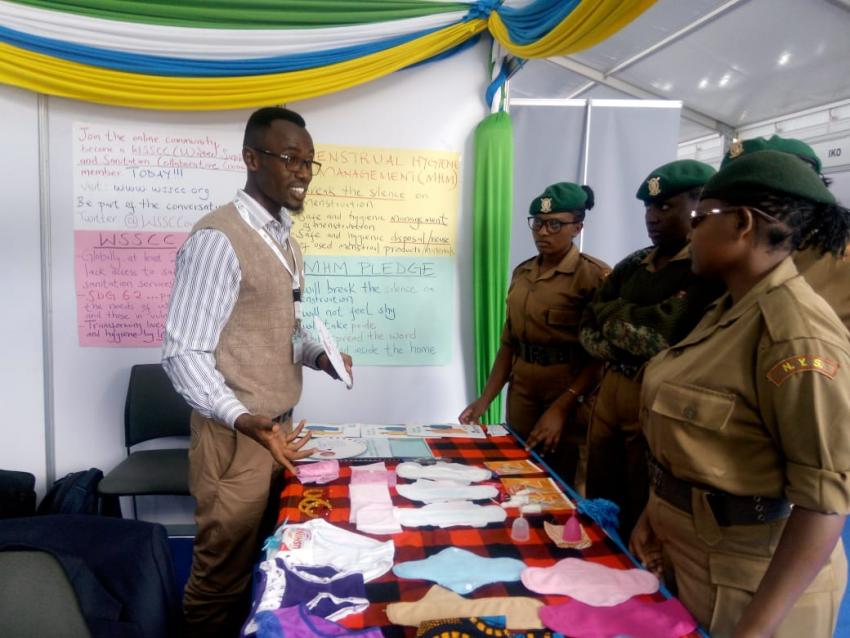Special children's sessions on menstrual hygiene during Sanitation Conference show need for education and information on the topic.
Published on: 13/11/2019
It is estimated that 80 per cent of Kenyans do not have access to safely managed sanitation, 75 per cent do not have access to basic sanitation and 12.5 per cent practice open defecation. Additionally, over 75 per cent of the country’s disease burden is caused by poor personal hygiene, inadequate sanitation practices and unsafe drinking water (KESH Policy 2016-2030). Beyond these numbers, lies a grim picture of inaccessibility and unavailability of menstrual products coupled with partial or complete lack of information on menstruation. These elements have not only exacerbated vulnerability faced by menstruating adolescent girls and women, but have significantly contributed to promoting discrimination and non-inclusivity leading to undignified menstrual experiences.
In a ministerial communiqué by the Cabinet Secretary of the Ministry of Water & Sanitation and Irrigation, Mr Simon K. Chelugui pointed out that the Ministry will work closely with the Ministry of Education and Health and relevant stakeholders to enhance appropriate sanitation and hygiene practices in all schools. Further, the Ministry is cognizant of SDG 6.2 which aims by 2030, to achieve access to adequate and equitable sanitation and hygiene for all, and end open defecation, paying special attention to the needs of women and girls and those in vulnerable situations.
During the recent Kenya Sanitation Conference, the Ministry presented Menstrual Hygiene Management (MHM) sessions during the children’s conference facilitated by the Water Supply and Sanitation Collaborative Council on the first day of the conference - 28 October 2019. “Is it true that using pads before you start menstruating will trigger menses?” Asked a grade six pupil from Murang’a County. “There are girls in my school who use pads yet they have never menstruated, they do this because of peer pressure. These girls feel left out when others use pads, they are under duress to fit in the group of menstruating girls”, she concluded. The MHM lab where these sessions were conducted is considered a safe space for women and girls to talk freely and openly about menstruation. The conference took place barely two months after an incident in Bomet County where a girl, aged 12, committed suicide allegedly after period shaming in early September. It was Jackline’s first time.
At the sessions, it became clear that there is need to provide reliable, pragmatic and factual menstrual information to girls before they experience their first menstruation. When having their first period (menarche), girls go through embarrassment, shame, anxiety and confusion simply because they don’t know what is happening to their bodies. According to situation analysis by the Ministry of Health 2016, the median age for menarche in Kenya stands at 14.4 years. 87.7 per cent of girls receive the information about menstruation from their mothers and 15.5 per cent from teachers. While parents remain the primary source of information, they are mostly concerned with ensuring that their daughters avoid teenage pregnancy. Minimal attention is given to menstrual health and hygiene with adolescent girls and boys reporting that it is shameful to discuss menstruation.

In the exhibition area, conference participants and the public visited the MHM lab.
Kenya has adopted the three-pronged approach to MHM that include:
Adolescent girls and women need to have information on various options available to manage menstrual flow. Of importance is provision of information on a variety of menstrual products and materials (both disposable and reusable options) that can be used to manage menstruation so that girls and women can make informed choices.. They also need access to bins for disposing of sanitary material, facilities that provide privacy for changing. They need access to soap and water. The lives of women and girls should not be impeded simply because they are menstruating.
At IRC we have strong opinions and we value honest and frank discussion, so you won't be surprised to hear that not all the opinions on this site represent our official policy.